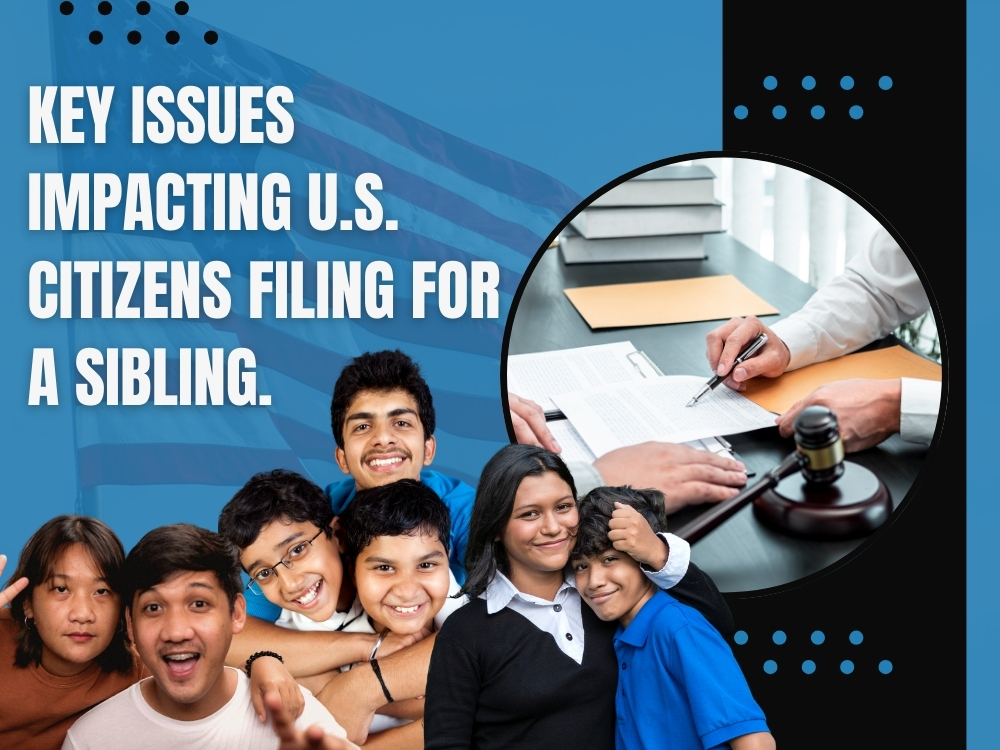Family unity has always been a core principle of U.S. immigration law. For many U.S. citizens, this includes the desire to petition for a brother or sister to obtain permanent residency in the United States. However, bringing a brother or sister into the country through family-based immigration is not a quick process. It involves a complex set of rules, limited visa availability, and extended waiting periods.
That is why understanding the U.S. citizen filing for a brother or sister processing time is important. By knowing what to expect, applicants or their families can set realistic expectations, plan ahead and prepare for the challenges of the process.
What Is the Sibling Green Card?
 When a U.S. citizen petitions for their sibling, the case falls under the Family Fourth Preference Category (F4). This type of petition differs from those made for immediate relatives like parents, spouses, or unmarried minor children. For immediate relatives, they are not limited by visa caps.
When a U.S. citizen petitions for their sibling, the case falls under the Family Fourth Preference Category (F4). This type of petition differs from those made for immediate relatives like parents, spouses, or unmarried minor children. For immediate relatives, they are not limited by visa caps.
However, siblings do not qualify for unlimited visas as they are subject to annual visa caps. This means that there are limited visas issued to brothers and sisters of U.S. citizens every year.
Because of this, the U.S. citizen filing for a brother or sister processing time is much longer than other family petitions. The wait time is, however, dependent on factors like the applicant’s nationality and the overall visa demand.
What Are The Sibling Green Card Application Steps?
If you are planning to apply for a green card for a brother or sister, here are the major steps involved:
Filing Form I-130 (Petition for Alien Relative)
The process begins when a U.S. citizen submits Form I-130 to U.S. Citizenship and Immigration Services (USCIS). This form proves the family relationship between the petitioner and the sibling. Supporting evidence include birth certificates showing the shared parents along with documents establishing the petitioner’s U.S. citizenship.
Petition Review and Priority Date
USCIS reviews the petition to confirm eligibility. Approval does not mean the sibling can immigrate immediately. Instead, the approval establishes a priority date, which determines the sibling’s place in line for a visa under the family preference system (F4 category).
Waiting for Visa Availability
Following approval by USCIS, the case is transferred to the National Visa Center (NVC), but the NVC cannot proceed until a visa number is allocated. Due to limited visa availability, siblings frequently experience several years of delay before obtaining a visa number. This waiting period is where the weight of the U.S. citizen filing for a brother or sister processing time is experienced.
Consular Processing or Adjustment of Status
Once a visa is available, the National Visa Center coordinates the next steps. If the sibling is abroad, they complete consular processing. If they are already legally residing in the U.S., they may proceed with an adjustment of status with USCIS.
Factors Affecting U.S. Citizen Filing for a Brother or Sister Processing Time
 Certain factors make the U.S. citizen filing for a brother or sister processing time unpredictable, and some notable of them include:
Certain factors make the U.S. citizen filing for a brother or sister processing time unpredictable, and some notable of them include:
Country of Origin: Applications from countries where there is high demand, such as Mexico, India, and the Philippines, often face much longer wait times. This is due to a law requiring visas to be allocated by category and country. No single country can take up more than a set percentage of the annual allocation.
Annual Visa Limits: Approximately 65,000 visas are issued globally each year to siblings of U.S. citizens. If this amount is reached, applicants will have to wait until next fiscal year.
Priority Dates and Backlogs: Each month, the Department of State releases a Visa Bulletin. The bulletin publishes the priority dates for each family-based category.
USCIS Processing Speed: Before reaching the NVC stage, the initial USCIS processing of Form I-130 can take time. It might take several months to over a year, depending on case volume and workload.
What Is the Average U.S. Citizen Filing for a Brother or Sister Processing Time?
Although processing times change depending on workload and policy, applicants from most countries wait an average of 10 to 20 years. Those applying from Mexico, India, and the Philippines may wait more than 20 years for a visa. This reality makes families view sibling sponsorship as a long-term plan.
Helpful Strategies During Waiting Period
Even though families cannot speed up the waiting period, they can still do the following to keep themselves prepared:
- Inform USCIS and the National Visa Center of any address or status change to avoid delays.
- Keep an eye on the monthly bulletin issued by the State Department to know when their priority date is approaching.
- Gather all the necessary documents early.
- Check alternative opportunities such as work visas, student visas, or the Diversity Visa Lottery while waiting.
- Keep copies of all submitted documents since cases can take decades to be resolved.
Do You Need an Immigration Lawyer to File for a Brother or Sister?
The U.S. citizen filing for a brother or sister processing time is one of the longest family-based immigration processes. However, our attorneys at Warren Law Firm are here to provide advice and support, where needed. That way, you can ensure all requirements are met and timelines are understood. Request a consultation with Warren Law Firm today and let us discuss how you can reunite with your family.
